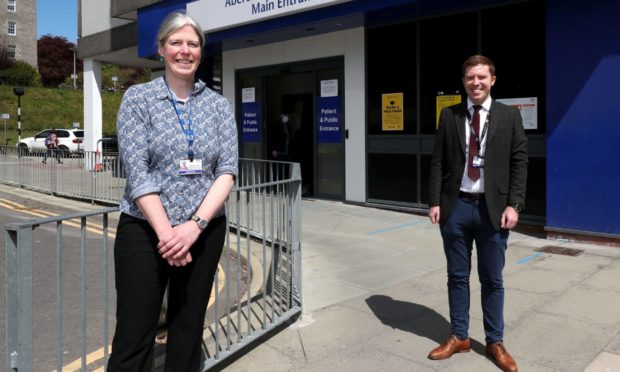Every north-east patient who needed hospital treatment for Covid-19 will get a mental health screening to help cut rates of depression, anxiety and PTSD.
Around 1,300 people in Grampian have required treatment in hospital for the coronavirus since the start of the pandemic.
It is estimated as many as one-third of them could have long-lasting mental health difficulties as a result.
The Scottish Government is making cash available to all health boards to help tackle the potential issues now, before they have time to snowball into a larger crisis.
If the funding application is granted, it is hoped clinicians will have reached out to every patient affected within the next year.
While the fine details of the initiative are still being worked out, it is planned for everyone opting in to receive a 30-minute appointment – virtually or in person – with a psychologist or psychiatrist.
From there, they can be given additional information or a referral for further mental health support or treatment.
Mental health impact of hospital stays
Consultant clinical neuropsychologist Dr Maggie Whyte, one of the project leads, said mental health problems are often more prominent in those who have been hospitalised.
“We know there is a higher percentage of people who suffer from anxiety and depression following admission, particularly to intensive care,” she added.
“PTSD is also more common than in the usual population.
“If you’re admitted to hospital during the pandemic and you’re hearing the death stats and stories of people who’ve passed away, that makes it a particularly stressful experience.
“The other influence is that you don’t have your family members as close – although limited visiting has been available more recently.
“So it’s an assumption, but it is potentially a more stressful experience for people.”
The full long-term impact on hospital patients’ mental health is still being assessed, but early studies have found around 25% have symptoms of depression or anxiety after being discharged from Covid treatment.
Dr Murray Smith, a consultant liaison psychiatrist who is also heading up the project, said lessons have been learned from the 2003 SARS epidemic.
He added: “We thought about one-quarter of people who had mental health problems still have PTSD a couple of years later.
“And with this type of population, if we can get in a bit earlier the evidence seems to show we can reduce these rates.
“In Lothian about one-third of patients, three months after hospital, have had some sort of mental health symptom.
“The ones who were seen (by mental health professionals) had fewer issues.
“We’re only just starting to get set up and the pandemic has already been going on for more than a year, so hopefully we can get to people before it gets too late.”
Numbers likely higher than ever before
If funding is approved, recruitment to the team will begin immediately with a view to the service launching in the summer.
While the team will likely be “very small”, it will include input from psychiatrists, psychologists, occupational therapists and support staff.
The grant would allow the scheme to run for two years, with a potential one-year extension if required.
Dr Whyte said: “It’s very important to recognise the link between our physical and mental health, as it is key – particularly with Covid-19.
“There is a whole range of physical symptoms that people have experienced past 12 weeks from the acute phase of the illness.
“That is impacting on their mental health, and their mental health is also impacting on their physical recovery.”
Dr Smith added: “This is an area where there’s not a huge amount of resources anyway for patients that have mental health problems related to physical health problems.
“We can manage small numbers but these are much higher numbers than we’ve seen before.
“The services, as they are at the moment, can be fairly patchy, so getting something set up soon is vitally important.”


